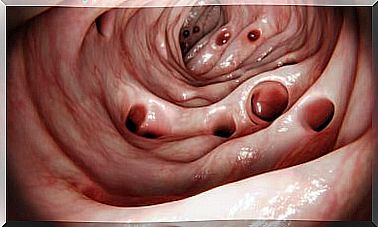Problems That Can Be Caused By Not Chewing Food Well
Suffering heavy digestions or eating more than you should are among the problems derived from not chewing well, so it is convenient to know how to do it properly

Although chewing well seems like a very simple habit to put into practice, the truth is that many people have problems when it comes to doing it correctly. The urge to eat or habit causes many to swallow food without chewing it properly.
As a consequence, afterwards they may suffer some digestive problems. In fact, this can even influence weight gain. According to some studies, chewing food well before swallowing could help reduce intake and control weight.
Many people still ignore this habit, not knowing that it is essential to have a good digestion. Every time we put food in our mouth and chew it, we are fulfilling a very important step in our digestion.
Read this article and discover why it is important to chew your food well and what steps you can take if you want to chew it well. Take note!
Why is it so important to chew your food well?
By chewing food well, we give saliva time to secrete an enzyme called ptyalin , which is responsible for breaking down carbohydrates.
On the contrary, when we do not chew properly, food continues on its way to the rest of the digestive system without said enzyme. Because of this, the body will have to work twice as hard to eliminate everything it doesn’t need.
Problems from not chewing food well
In short, not chewing well could decrease proper enzyme secretion. This process makes certain organs work harder than they should in order to break down certain substances.
In addition, when we do not chew well and make it difficult to break down food, the body is not able to separate nutrients well . This can lead to problems such as the following:
- Digestive problems. By preventing its proper decomposition and lubrication, not chewing well can cause a feeling of heaviness, gas or constipation.
- Slow metabolism When we do not chew food correctly we are also hindering the function of the organs in charge of metabolizing them. Heavy digestions slow down metabolism and decrease caloric expenditure.
- Weight gain. A slow metabolism is also synonymous with weight gain, since the body does not burn calories easily and accumulates waste that it is difficult to eliminate. But, in addition, not chewing well causes us to eat more than we should, since we do not experience a feeling of satiety.
Recommendations to chew well
Once you have seen the consequences of not chewing well, it is time to take note of the following recommendations. So you can do it in a correct way.
To start, try to leave a space between each food, so that you can take the time to chew properly. Even if the food is not heavy, it is necessary to chew as often as necessary, depending on the type of food, its size and its hardness.
Ideally, eat in a calm, quiet environment free from any distractions. Noise, television, cell phones or computers can make you unconsciously eat quickly and without chewing your food well.
There is evidence that distraction during meals can lead to feelings of fullness being ignored and therefore lead to an increased risk of obesity.
If you have trouble chewing your food, a good idea is to cut it into chunks before putting it in your mouth. By doing so, you can chew it well and without taking so long.
What are the benefits of chewing well?
Since you already know how you can chew well, now you must take note of the benefits that this can bring you. Pay attention!

Contributes to better digestion
When you chew your food well, you save a lot of time for your digestive system and the organs in charge of filtering nutrients for the body.
Thanks to this habit we manage to form a digestible food bolus. This allows the body to easily separate the waste it has to eliminate. In addition, it will help prevent problems with indigestion, gas, stomach pain, bloating and slow intestinal transit.
May provide a feeling of satiety
Taking adequate time to chew properly is key to stimulating your taste buds and brain. Well-chewed foods make you feel full sooner, so they can prevent us from overeating.
Pleasure
Although we cannot perceive it directly, food and its flavors stimulate certain organs of our body and their emotions. Hence the importance of chewing properly, since in this way the brain fully registers the taste of the food and provides greater satisfaction.
In addition, according to some studies, chewing has a positive effect on attention, and especially on sustained attention, in addition to improving mood and relieving stress.
So, take your time to chew your food well. In this way, you could avoid some problems when doing digestion.









